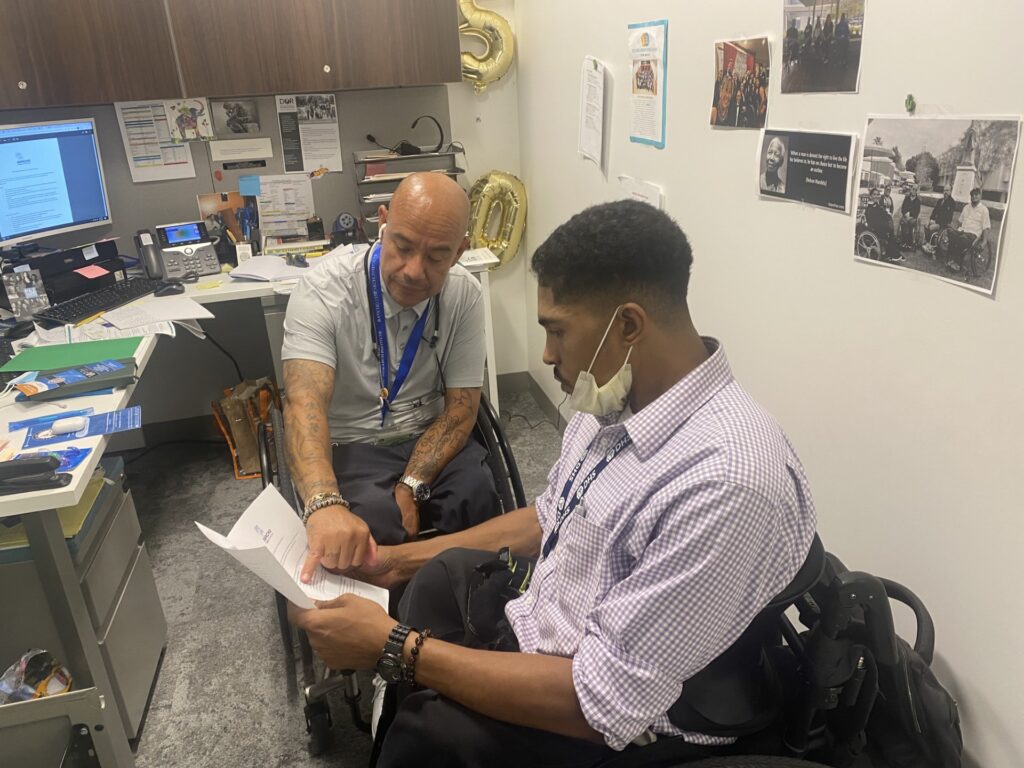Peer Mentors Help Build Paths to Success
Finding someone who understands what you are going through can be pivotal after a traumatic injury. We all need help and support—from family and friends, counselors, doctors, lawyers, and teachers—but where does one turn to learn about managing a new normal after a spinal injury? Doctors can help you understand your medical needs and lawyers are there to respond to legal questions, but who is going to help you apply for Social Security benefits? Living with a spinal cord injury (SCI) is hard to comprehend for a newly injured person and their loved ones, and finding mentors who have lived through what they are experiencing can offer insights no one else can.
For individuals with SCI, the early weeks of recovery are vital. They set the course for how you will respond to treatment and how successful your transition to life and community will be. At this time, it’s often a stranger in a wheelchair who can become the friend you didn’t know you needed. A peer mentor who has overcome their own obstacles and challenges can help guide you through an uncertain time. This support offers first-hand accounts to give an individual an understanding of how to manage their current situation and how to prepare for what may be to come.

The Neilsen Foundation is very proud to partner with organizations who provide peer mentorship networks, which seek to match people to individuals that have more lived experience that reflect a person’s socioeconomic, cultural, and ethnic backgrounds. These mentors can provide guidance, helping individuals set goals. They help establish expectations as one transitions from the hospital to home and back into their community. Whether it’s getting back behind the wheel of a car, dating, or seeking out sports and other social groups, it’s important to learn how.
Some mentors insist their injury was a turning point—a chance to find a purpose in life and help others in need. Rancho Los Amigos Rehabilitation Center in Downey, California provides opportunities for people to share their experiences. A former gang member who was paralyzed by a gunshot wound, Juan Garibay signed up as a volunteer peer mentor and now serves as the Program Manager for the Rancho Violence Recovery and Prevention Program. He explains, “We connect individuals and family members to services and resources that are going to help them improve their quality of life.”
Others know exactly how vital peer support can be from their own experience. When Kimberly Hill’s 15-year-old son sustained a SCI nine years ago, she felt she needed a mom with lived experience she could talk to. “There’s so much that you’re dealing with: ‘What do I apply for? Who do I turn to for help? What is a spinal cord injury? What is all this terminology?’” Kimberly, now the Executive Director of the Louisiana Chapter of United Spinal Association, recalls. “Having that support could have provided a little bit of guidance and provided me with a safe person to turn to or call and cry.”
She leads a program that connects people with SCI across Louisiana and their caregivers to peer mentors: “We have been able to identify ambassadors in the different regions of our state to act as liaisons to help grow knowledge and build connections. Neilsen Foundation funding has helped us serve a huge need in caregiver peer mentoring that has recently been identified by our organization.”